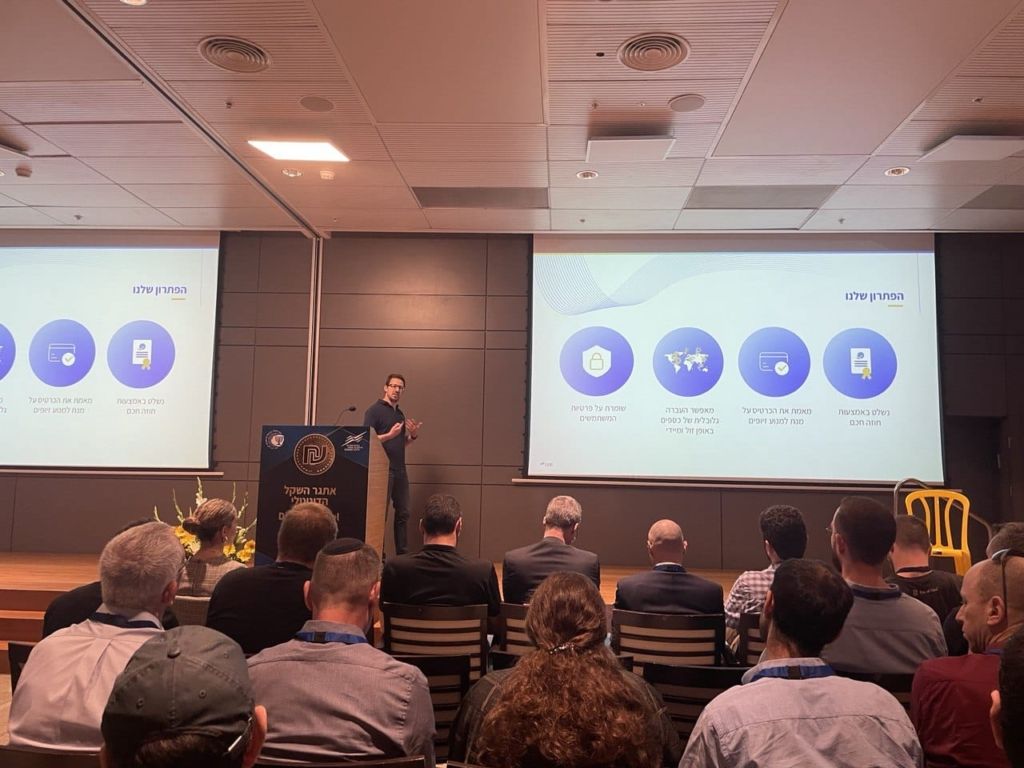Bank of Israel’s Digital Shekel Challenge Highlights COTI’s Blockchain Innovation in CBDC
The Bank of Israel’s Digital Shekel Challenge came to an end today at the Tel Aviv Stock Exchange with finaal presentations and awards. A judging panel was shown a state-of-the-art decentralized marketplace for Real-World Assets (RWAs) enabled by the Layer 2 privacy blockchain COTI .
Alongside teams like PayPal, Fireblocks, and a dozen others with financial, privacy, and networking expertise, COTI emerged as the only blockchain initiative to make it to the Digital Shekel Challenge’s final stages. An award was given to Paypal’s salary management system.
Developing a two-tier approach for issuing a CBDC with an API layer that offers a set of features for payment service providers was the main objective of the task. The solution must simultaneously protect user privacy, optimize for security and dependability, and link end users to a wide variety of cutting-edge services.

To bridge the gap between web3 and conventional banking systems, COTI submitted a decentralized event ticket marketplace that allowed counterparties to deal in their local currency while using the Digital Shekel as the mediating currency. Icebreaker, a cross-border CBDC payment system created by the BIS (Bank for International Settlements), served as its model.
Implementing a marketplace based on smart contracts reduced transaction costs and conversion rates, eliminated the need for middlemen, and reduced fraud. Although COTI’s demonstration was centered on concert tickets, the idea might be used in many international markets by streamlining asset exchange via a CBDC.
The Digital Shekel Challenge demo from COTI is available here: https://youtu.be/D1VqgRjOVP4?feature=shared
There is a lot of interest in CBDCs; three nations have already introduced one, forty-four are in the testing stage, and twenty more are actively developing. COTI supports CBDC implementations that balance privacy and openness so that business may thrive without worrying about government overreach.
In order to show how privacy-by-design may protect the expansion of open digital markets while upholding user privacy and financial independence, COTI submitted a proposal to the Bank of Israel Digital Shekel Challenge.
COTI’s privacy-focused blockchain provides cutting-edge functionality for safely storing and transacting with CBDCs. Its quick and portable privacy solution, which can operate on any device, even mobile ones, employs a revolutionary implementation of garbled circuits and offers a far lower operating cost than current privacy solutions. CBDCs as a safe payment method might be improved by the technology. Moving forward, COTI will focus on creating more use cases that address privacy issues in CBDC design.
The COTI Network is Web3’s quickest and lightest confidentiality layer. COTI presents the most sophisticated and compatible solution for data security on the public blockchain, driven by the ground-breaking cryptographic protocol Garbled Circuits. COTI opens up a whole new realm of use cases, such as decentralized identity, DeFi, artificial intelligence, and confidential transactions, paving the way for the next wave of Web3 innovation and adoption.
Disclaimer: The content of this article solely reflects the author's opinion and does not represent the platform in any capacity. This article is not intended to serve as a reference for making investment decisions.
You may also like
World Chain Integrates Circle’s USDC Via CCTP V2
Ant International Applies for Stablecoin Licenses in Key Markets
Japanese Fashion Giant ANAP Holdings Boosts Bitcoin Reserve
Bitcoin and Ethereum Prices Surge Amidst Global Market Turbulence